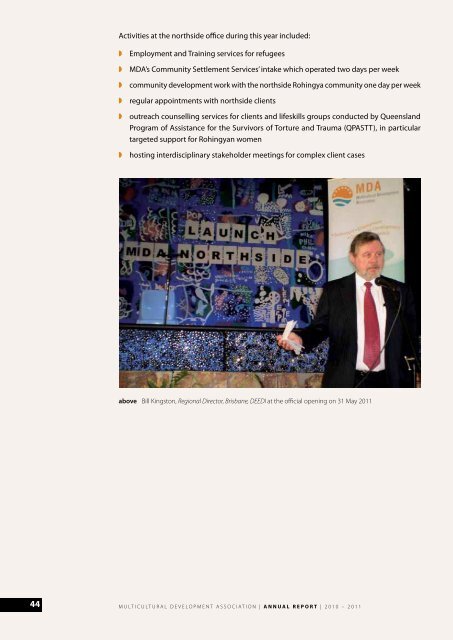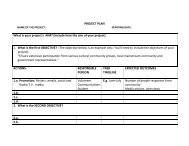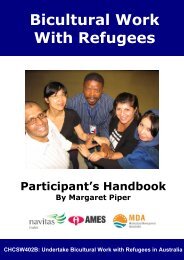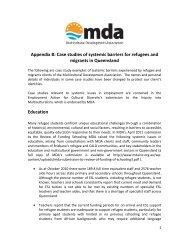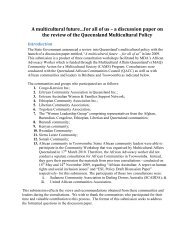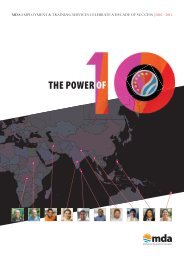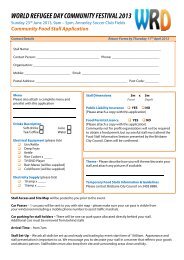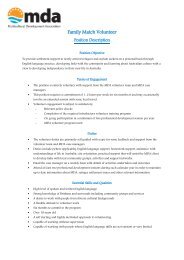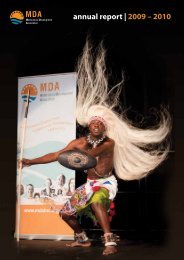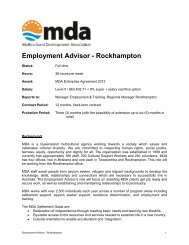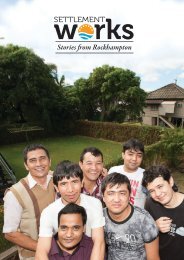annual report 2010 â2011 - Multicultural Development Association
annual report 2010 â2011 - Multicultural Development Association
annual report 2010 â2011 - Multicultural Development Association
Create successful ePaper yourself
Turn your PDF publications into a flip-book with our unique Google optimized e-Paper software.
Activities at the northside office during this year included:<br />
◗◗<br />
Employment and Training services for refugees<br />
Floods<br />
◗◗<br />
◗◗<br />
◗◗<br />
◗◗<br />
◗◗<br />
MDA’s Community Settlement Services’ intake which operated two days per week<br />
community development work with the northside Rohingya community one day per week<br />
regular appointments with northside clients<br />
outreach counselling services for clients and lifeskills groups conducted by Queensland<br />
Program of Assistance for the Survivors of Torture and Trauma (QPASTT), in particular<br />
targeted support for Rohingyan women<br />
hosting interdisciplinary stakeholder meetings for complex client cases<br />
In January 2011, Queensland was hit by the worst floods since 1974. At its peak, around 20,000<br />
houses were flooded in Brisbane alone.<br />
During the flood crisis, MDA’s staff worked quickly to provide various types of flood related<br />
assistance and support to 1,500 refugee families. At the peak of the crisis there were<br />
approximately 70 families displaced from their homes.<br />
MDA’s flood disaster management plan ensured that staff were able to respond immediately<br />
to the needs of our clients and wider refugee communities. Our work was supported through<br />
the use of MDA’s fee-for-service bicultural support service arm which engaged 15 Cultural<br />
Support Workers to provide language support in disseminating vital information about safety<br />
and evacuation. In addition to this, MDA’s well established community networks enabled staff<br />
to work closely with 36 refugee and migrant community leaders in contacting each of their<br />
communities with safety information.<br />
During the crisis, the State Emergency Services (SES) provided excellent support to the<br />
community at large. It must be noted however that the emergency response was based on<br />
the voluntary evacuation of people with the assumption that all people have access to private<br />
transport, have established support networks to access shelter or speak fluent English. Many<br />
of our clients have very large families and do not possess a driver’s licence, let alone a car.<br />
above Bill Kingston, Regional Director, Brisbane, DEEDI at the official opening on 31 May 2011<br />
A large component of our work involved assisting families to voluntarily evacuate their homes<br />
and transporting them to the closest evacuation centre. In addition to this, our staff provided<br />
intensive language support and interpreting services due to the lack of proper interpreter<br />
engagement by government departments.<br />
Many clients experienced frustration due to feelings of helplessness and fear, with some<br />
experiencing difficulty adjusting to new homes. This was further compounded for many by<br />
retraumatisation from previous experiences in their home countries as well as settlement<br />
issues already present in adjusting to life in Australia.<br />
MDA was overwhelmed with offers of help not just from the public at large, but also from<br />
numerous refugee groups eager to give back to the community.<br />
In all, 120 volunteers from nine refugee communities contributed to the clean up process. It<br />
was extremely heartening to hear positive feedback given to our case workers at this time.<br />
44 MULTICULTURAL DEVELOPMENT ASSOCIATION | ANNUAL REPORT | <strong>2010</strong> – 2011 MULTICULTURAL DEVELOPMENT ASSOCIATION | ANNUAL REPORT | <strong>2010</strong> – 2011<br />
45


